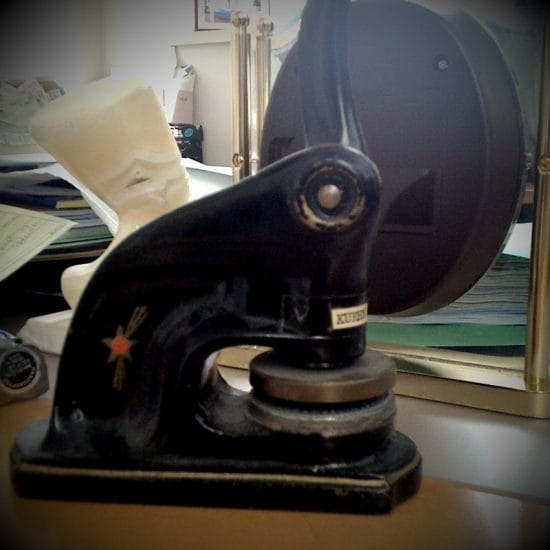
How Much Are Notary Fees?
When I was growing up in North Carolina my friend’s mom was a notary and she would notarize any papers my family or I free of charge so the idea of charging for someone to stamp a piece of paper was foreign to me. However, notary fees weren’t always capped. In fact, there was a point in time where notaries could charge however much money they wanted to charge for a single page (some of the higher fees capping out around $20).
When states made notary fees a state-mandated charge it stopped notaries from being able to price gouge. There are a few states that still don’t limit their notary fees but most have a cap of about $5 (some even less). Depending on your state, you may pay as little as $1 for a notarized document.
What Are Notary Fees State-to-State?

For the most part, however, notary fees are set by state statue. Below is a table that breaks down the maximum notary fee of each state.
Maximum Fees Allowed For Most Single-Page, Single-Signature Notarizations By State*
| State | Maximum Fee |
| Alabama | $1.50 |
| Alaska | No limit** |
| Arizona | $2.00 |
| Arkansas | $5.00 |
| California | $10.00 |
| Colorado | $5.00 |
| Connecticut | $5.00 |
| Delaware | $5.00 |
| District of Columbia | $2.00 |
| Florida | $10.00 |
| Georgia | $2.00 |
| Hawaii | $5.00 |
| Idaho | $2.00 |
| Illinois | $1.00 |
| Indiana | $2.00 |
| Iowa | No limit** |
| Kansas | No limit** |
| Kentucky | $0.50 |
| Louisiana | No limit** |
| Maine | No limit** |
| Maryland | $2.00 |
| Massachusetts | Varies |
| Michigan | $10.00 |
| Minnesota | $1.00 |
| Mississippi | $5.00 |
| Missouri | $2.00 |
| Montana | $5.00 |
| Nebraska | $5.00 |
| Nevada | $5.00 |
| New Hampshire | $10.00 |
| New Jersey | $2.50 |
| New Mexico | $5.00 |
| New York | $2.00 |
| North Carolina | $5.00 |
| North Dakota | $5.00 |
| Ohio | $1.50 |
| Oklahoma | $5.00 |
| Oregon | $5.00 |
| Pennsylvania | $5.00 |
| Rhode Island | $1.00 |
| South Carolina | $0.50 |
| South Dakota | $10.00 |
| Tennessee | Varies* |
| Texas | $6.00 |
| Utah | $5.00 |
| Vermont | Varies* |
| Virginia | $5.00 |
| Washington | $10.00 |
| West Virginia | $2.00 |
| Wisconsin | $0.50 |
| Wyoming | $2.00 |
* Notary fees may differ by county. A notary public may charge a reasonable fee for a notarial act.*
**A notary public may charge a reasonable fee for the performance of a notarial act**
Odd Notary Fees
There are a few exceptions to this rule. Home loans, for example, may have much higher notary fees than an automobile title. You may see notary fees for home loans for $100 or more.
Notaries are allowed to charge more for loan signing services in many cases. This is because it is not a simple signature like many other notary exchanges. Closing a mortgage loan oftentimes takes up more than an hour of the notary’s time so you are not just paying for their signature, you are also paying for their time. Not to mention home loans have (sometimes) up to 100 signatures throughout the document.
If you have questions as to how much a notary should be paid for a specific documents don’t hesitate to ask the notary directly. You can also call your state government office for more information.
Ways to Save Money on Notary Fees
Most of the time when you are signing a large document, like a mortgage, you don’t have control over how much you will pay in notary fees. The good news is that, unless you buy and sell homes often, you won’t likely have to pay those astronomical prices.
In fact, having to have a notary to sign anything for you is a rare occurrence so you likely won’t see any lifetime savings from any notary fee loopholes or “ways to save.” However, if you have to have documents notarized frequently you may want to simply think outside the box. Instead of going to the usual places like banks and office supply stores, you may want to find a private notary. You may be able to get a lower price and also get them to sign outside of the normal business hours.
Free Notarized Documents
You might be surprised who is a notary. As I previously stated, my friend’s mother was a notary growing up. Most people in the neighborhood went to her when they needed things notarized and, depending on how close you were to her, you may get away free-of-charge.
Outside of personal relationships you can also usually get documents notarized at banks and credit unions free-of-charge. If your local branch is convenient that is usually the best way to go to save yourself money on notary fees.
If you get a lot of things notarized it may pay off for you to get your own notary. Although it is against the law to notarize your own documents you can pay for an employee or co-worker to get their notary and simply always use their notary signatures for your documents free-of-charge.
All fees and laws associated with notarizing documents can change at any time. If you have any questions, check the latest information on your state’s website. Also be sure that you are adhering to all of the notary public rules. An infraction can cost you five to 10 years of your life.
Have you had to get something notarized? How much did you pay?
Photos: Jenn Turner and rachaelvoorhees

Amanda Blankenship is the Chief Editor for District Media. With a BA in journalism from Wingate University, she frequently writes for a handful of websites and loves to share her own personal finance story with others. When she isn’t typing away at her desk, she enjoys spending time with her daughter, son, husband, and dog. During her free time, you’re likely to find her with her nose in a book, hiking, or playing RPG video games.






Comments